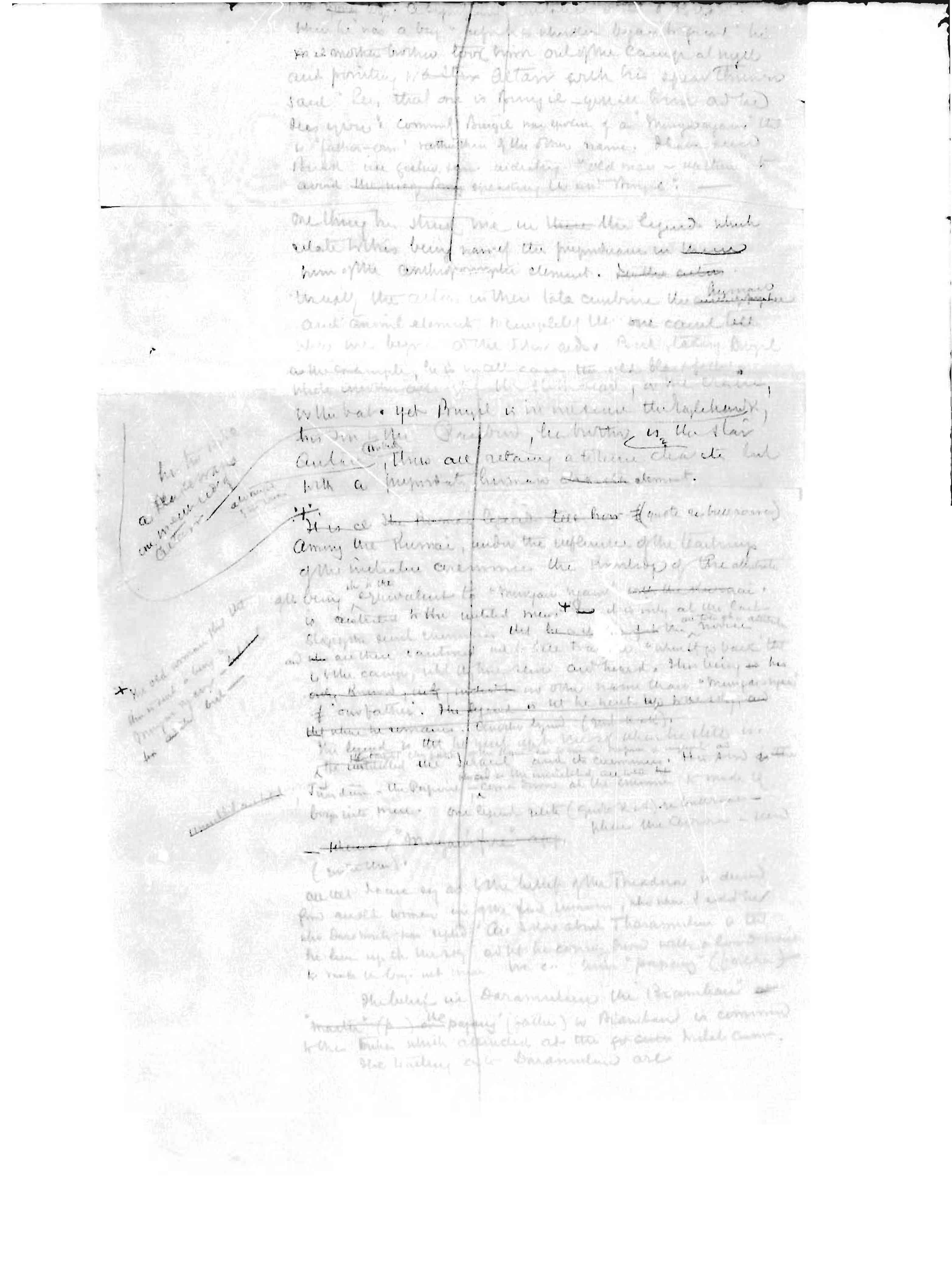Beliefs

Transcription - Page 2
When he was a boy "before his whiskers began to grow" his
[mot-crossed out] mothers brother took him out of the camp at night
and pointing, 'to [a star - crossed out] Altair with his spearthrower
said "See, that one is Bunjil - you see him and he
sees you." Commonly Bunjil was spoken of as "Mangan-ngaui" that
is "father-son" rather than by the other name. I have seen
Berak use gesture signs indicating "old man - up there" to
avoid [the using Bunj - crossed out] speaking the word Bunjil: -
One thing that struck me in [these - crossed out] the legends which
relate to this being namely the preponderances in [crossed out - them]
him of the anthropomorphic element. [crossed out - In the custom]
Usually the actors in these tales combine the human [anthropomorphic- crossed out]
and animal elements so completely that one cannot tell
where one begins and the other ends. But taking Bunjil
as an example, he is in all cases the old blackfellow.
[Cannot read line]
is the bat. Yet Bunjil is in nature the Eaglehawk,
his son is the Rainbow, his brother is the star
Antari, thus all retaining a totemic character but
with a preponderate human [character - crossed out] element.
[Left hand margin note]
his two wives
as Black swans
one on either side of
Altair
[2 lines - illegible]
[words crossed out - It is a The Kurnai legends tell how] (quote the bullroarer)
Among the Kurnai, under the influene of the teachings
of the initiation ceremonies the knowledge of the attributes
of the being who is the equivalent to "Mungan ngaui'" [crossed out - with the Kurnai]
is restricted to the initiated men. + it is only at the last
stage of such ceremonies that they are told of his attributes novices
and are then cautioned not to tell [illegible word/s] " when they go back" that
is to the camp, what they have seen and heard. This being his
[crossed out - only Kurnai, in by individuals] no other name than "Mungan ngaui"
"our father". [The legend is that he went up in the sky and - crossed out]
[that's where he remains. Another legend (quote K + K) - crossed out]
Left hand margin + note]
The old woman knew that
there is such a being as
Mungan ngaui-
but -
The legend is that he went up to the sky where he still is.
[line illegible]
[?] the Jeraeil and its ceremonies. His son is the
Tūndūn the Porpoise as the initiated are told, came down at the ceremonies to make the
boys into men. One legend relates (quote K + K) re bullroarer
[where "Mungan fire" -crossed out] when the Aurora is seen
(quote this).
All that I can say as to the belief of the Theddora is derived
from an old womanone of the last survivors, who when I asked her
who Daramulun was replied " All I know about Tharamulun is that
he lives up in the sky and that he comes down with a loud noise
to make the boys into men. We call him "Papang" (father).
The belief in Daramulun the "Biamban"
["martia" (p. ) or - crossed out] the "papang" to Biamban is common and
to these tribes which attended at the [gr cere- crossed out] Initiation ceremonies.
The teaching as to Daramulun are
Document Details
